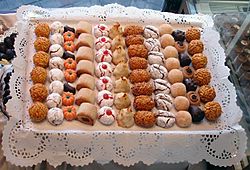Panellets facts for kids
 |
|
| Alternative names | Empiñonados |
|---|---|
| Type | Pastry |
| Place of origin | Spain |
| Region or state | Catalonia, Valencia, Aragon and Balearic Islands |
| Main ingredients | Marzipan, pine nuts |
Panellets (say "pah-nuh-YETS") are a special sweet treat from Catalonia, Andorra, Ibiza, and the Valencian Community. Their name means "little breads" in Catalan. These small, delicious cakes are a big part of the All Saints' Day celebration, which is known as Castanyada in these regions. People often enjoy panellets with roasted chestnuts and sweet potatoes.
Panellets are usually served with a sweet wine, like moscatell or mistela. They come in different shapes, but most are round. The main ingredient is marzipan, which is a sweet paste made from ground almonds and sugar. The most popular kind of panellet is covered in crunchy pine nuts. To make these, the marzipan is rolled in pine nuts and then brushed with egg to give them a shiny finish. In southern Spain, especially in Seville, these tasty cookies are called empiñonados.
Contents
What Are Panellets?
Panellets are small, round, or shaped cakes that are very popular during the autumn season. They are a traditional dessert for the All Saints' Day holiday.
Main Ingredients
The most important part of a panellet is the marzipan. This sweet dough is made by mixing finely ground almonds with sugar. It gives panellets their unique, soft texture and sweet flavor.
Many panellets are covered with other ingredients to create different flavors:
- Pine Nut Panellets: These are the most famous. The marzipan is rolled in small, crunchy pine nuts.
- Other Flavors: You can also find panellets flavored with coffee, chocolate, coconut, or quince.
How They Are Made
Making panellets involves a few simple steps:
- First, the marzipan dough is prepared.
- Then, small pieces of the dough are shaped, often into little balls.
- Next, they are rolled in pine nuts or other toppings.
- Finally, they are baked quickly until they are golden and slightly crispy on the outside.
A Sweet History
Panellets have a long history, dating back at least to the 18th century. In the past, they were considered a special, blessed food. People would share them after important religious events. This tradition shows how deeply connected panellets are to the culture and history of the regions where they are eaten.
Where Do They Come From?
While panellets are a big part of Spanish culture, especially in Catalonia, some people believe their origins might be from Northern Europe. However, because of the ingredients used, like almonds and sugar, it is also thought that they might have come from Arab traditions.
Special Status
Panellets have a special recognition within the European Union (EU) and the United Kingdom (UK). They have been given "Traditional Speciality Guaranteed" (TSG) status. This means that panellets are made using traditional methods and ingredients, protecting their unique character and history. It helps make sure that panellets are always made in the traditional way, keeping their special taste and quality.
See also
 In Spanish: Panellet para niños
In Spanish: Panellet para niños
 | Roy Wilkins |
 | John Lewis |
 | Linda Carol Brown |

